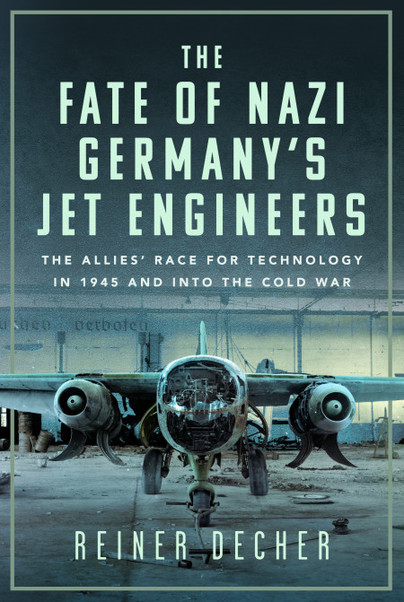The Fate of Nazi Germany’s Jet Engineers (Hardback)
The Allies' Race for Technology in 1945 and into the Cold War

Pages: 312
Illustrations: 32 mono illustrations
ISBN: 9781036111007
Published: 23rd September 2024
(click here for international delivery rates)
Order within the next 4 hours, 1 minute to get your order processed the next working day!
Need a currency converter? Check XE.com for live rates
| Other formats available - Buy the Hardback and get the eBook for £1.99! | Price |
|---|---|
| The Fate of Nazi Germany’s Jet… ePub (17.7 MB) Add to Basket | £6.99 |
In April 1945, American forces were sweeping eastwards toward Berlin, in part advancing across territory that would eventually become part of the Soviet Occupation Zone. As they advanced, US troops uncovered major parts of the manufacturing facilities and the people associated with the engines that powered Germany’s last generation of miliary aircraft: the jet fighters and bombers.
Understandably, the engine technology involved in powering these aircraft, such as the Messerschmitt Me 262 and the Arado Ar 234, was of great interest to the Allied nations. Among the many questions that needed to be answered was whether the Germans had made important breakthroughs in their successful use of these engines.
Having made these discoveries and seizures, the American authorities needed to decide exactly what they would do with them. Would they share the bounty with the other Allies? American collaboration with the British was a fact. The French, while Allies, were, in American eyes, militarily unimportant in realizing the defeat of Nazi Germany. Sharing technology with them was not of great interest. The Soviets were far behind, but nevertheless ambitious and keen to catch up to western military capability. The Americans knew their relation to the Soviets was tense and confrontational: no sharing was likely there.
From their perspective, Hitler’s jet engineers faced not only a lost war, but the economic and intellectual realities that work in Germany would not be available. They had technical knowledge and experiences that were undeniably valuable to the Allied victors. These nations would be engaged in a new competition for control of world affairs that would be called the Cold War.
While the major technical interests were atomic bombs, guided missiles, and jet engines, it is the last of these that is explored here. What happened to the people and to the institutions they would staff? This is the story of some who found homes and work in the US and in France and some who were brutally abducted to the Soviet Union.
This is also the story of American decisions made regarding the German jet engineers and the consequences for them as people and propulsion technology for American, French, and Soviet aviation. The competitive stance between the Soviet Union and the Western Allies was one of the key elements of the Cold War that followed. It led to a brutal Russian view and execution of war reparations that elevated the Soviet Union into a powerful position to challenge the West.
“The book blends technical insights with gripping historical narratives, emphasizing the ethical and geopolitical complexities of exploiting former enemy scientists. It is a good read for World War II and aerospace history enthusiasts.”
The Journal of the Air Force Historical Foundation - Spring 2025
About Reiner Decher
REINER DECHER’s father was an engineer, who worked on jet engines in Germany, France, and finally in the United States. Exposure to his father’s career led Reiner to complete a doctorate in aeronautical engineering at MIT and spend a career teaching and undertaking research at the University of Washington in Seattle. His academic focus was on aerodynamics, propulsion, and energy conversion. Industrial experiences include the AVCO-Everett Research Laboratory and The Boeing Company in the Propulsion Research Group.
Powering the World's Airliners Engine Developments from the Propeller to the Jet Age (Hardback)
The first efforts of man to fly were limited by his ability to generate sufficient power to lift a heavier-than-air machine off the ground. Propulsion and thrust have therefore been the most fundamental elements in the development of aircraft engines. From the simple propellers of the first airliners of the 1920s and 1930s, to the turboprops and turbojets of the modern era, the engines used in airliners have undergone dramatic development over a century of remarkable change. These advances are examined in detail by aeronautical engineer and author Reiner Decher, who provides a layman’s guide…
By Reiner DecherClick here to buy both titles for £50.00

















